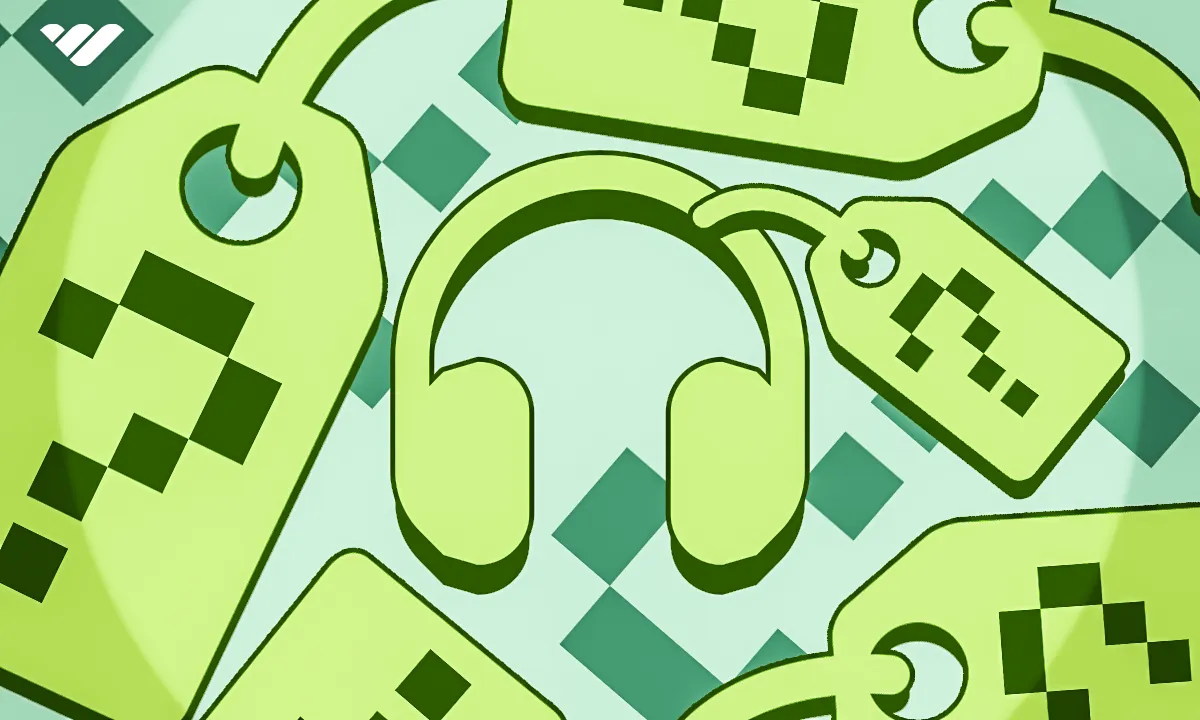Ready to launch the next smash hit podcast? Whop’s guide covers everything from getting started to costs to help you build your podcast with ease.
Key takeaways
- You can start a podcast for as little as $100 using budget equipment and free hosting platforms.
- Hosting platforms range from free to $150+ monthly, with paid options offering better storage and monetization tools.
- Successful podcasts can generate $500+ monthly through ads, sponsorships, subscriptions, and affiliate marketing.
Whether you’re building a brand or sharing something you love, podcasting is a great way to get your voice out there – and make big money in the process.
Podcasting can be a lucrative addition to an existing business or even become your standalone revenue stream.
The demand for podcasts is massive, with total listenership expected to hit 500 million this year, in a global market which is worth an eye-watering $27bn.
Even better, there are low barriers to entry and plenty of tools and platforms out there to support your podcasting dreams.
Here, we look at what you need to get started and – more importantly – what it will cost you to launch and run your podcast.
Why Start a Podcast?
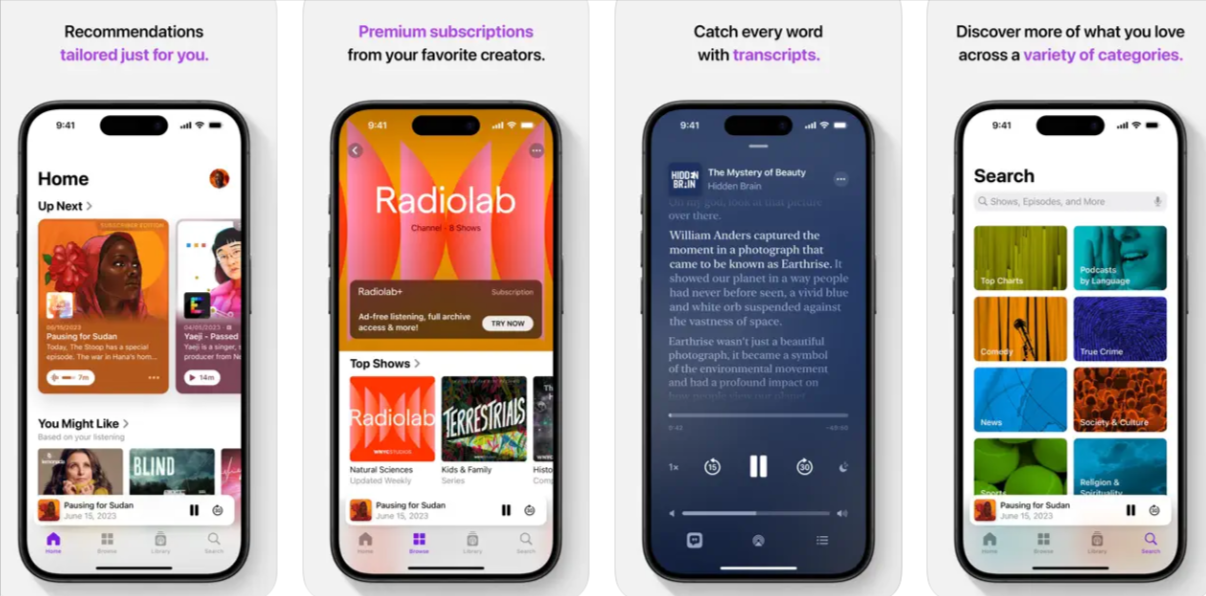
Podcasts are a great way to build your online presence. The nature of podcasts means that you can speak directly to your listeners, creating authority in your niche, and giving you scope to grow an audience and maximize your revenue streams.
In addition, a successful podcast can:
- Promote your business: Whatever type of business you already have (or want to launch), a podcast is a great promotional tool, alongside things like social media, blogging, guest posting, and eBooks.
- Establish trust: If you want to set yourself up as an authority in your niche, a podcast is a great way to communicate your expertise and credentials to an engaged audience.
- Monetize a hobby: Lots of successful podcasts started life as someone simply talking about things they were passionate about – choose a topic you love and you’re more likely to stick with your podcast for a long time.
How do podcasts make money?
There are several options to monetize a podcast. The main ways are:
- Selling ads: Relevant brands run ads during your podcast.
- Sponsors: A company pays you to promote their brand during your podcast.
- Merchandise: Popular podcasts tie in branded apparel and other merch.
- Related products: Podcasters often sell eBooks, courses, coaching, etc.
- Subscriptions: Charge for content, such as bonus episodes and newsletters.
- Affiliate marketing: Earn commission for promoting specific products on air.
The keys to successful podcast monetization include building an audience, establishing a brand, and publishing quality content on a regular schedule.
How big can you grow? Making upward of $500 a month is possible, with many podcasters making four, five or even six figures.
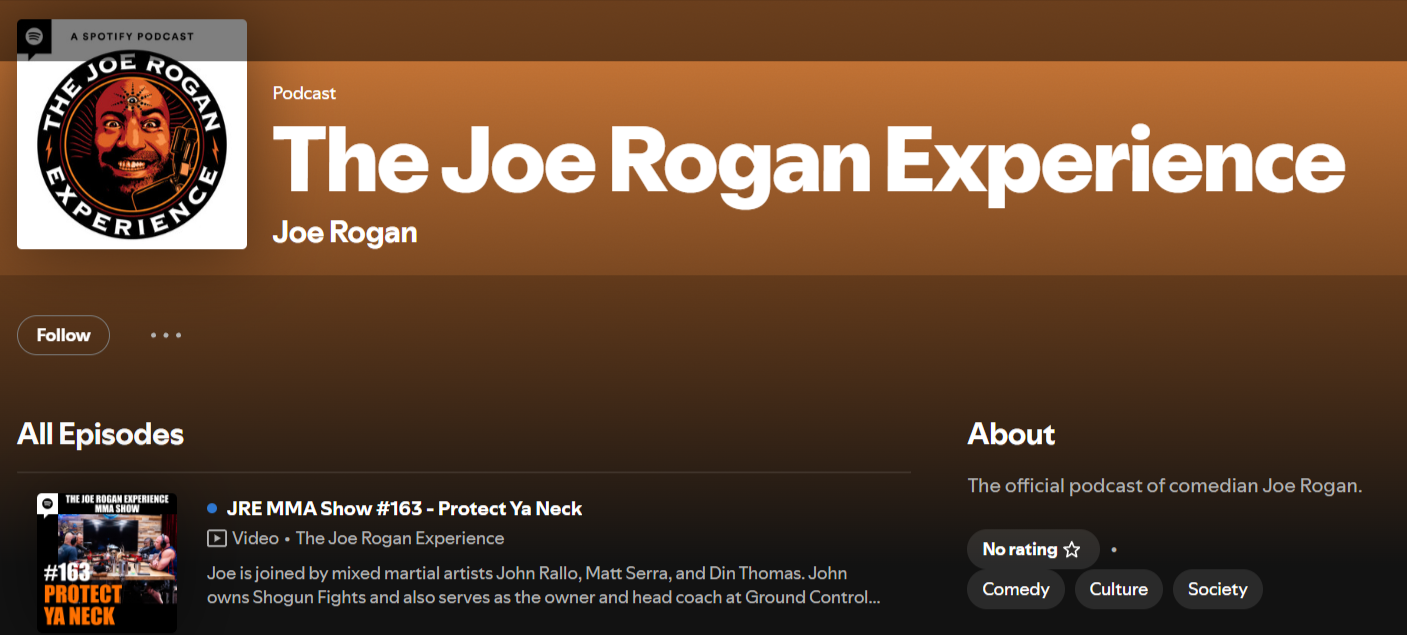
Launched in 2009, The Joe Rogan Experience has been the most lucrative podcast for a while now, with Spotify recently spending a whopping $250m for the exclusive rights.
What Do You Need to Start a Podcast?
To begin your podcasting journey, you’ll need a few basics. These include deciding on your podcast topic (or niche), the type of format you want to adopt, and your publishing schedule.
Choosing a niche is a key decision, as this will guide the type of content you produce and your schedule. For example, a current affairs podcast might work best as shorter episodes broadcast a couple of times a week. For other types of podcasts, once a week or even once a month might be the way to go.

When it comes to figuring out your budget for your podcast, the format will be a relevant factor.
Going solo, such as with a review, storytelling or editorial-style podcast, may be easier to pull off on a low budget than a podcast involving a call-in, panel discussion or interviews.
Whichever type of podcast style and topic, you will need:
- Podcast hosting platform
- Equipment
- Marketing streams
The good news is that you can get your podcast up and running quickly, even if you’re on a tight budget.
We’ll go through the two main expenditures of podcasting – hosting and equipment – to give you an idea of how much it will cost you.
We’ve included free and low-budget options, as well as the high-end alternatives.
Read our step-by-step guide to starting a podcast to get started.
Podcast Hosting Platforms
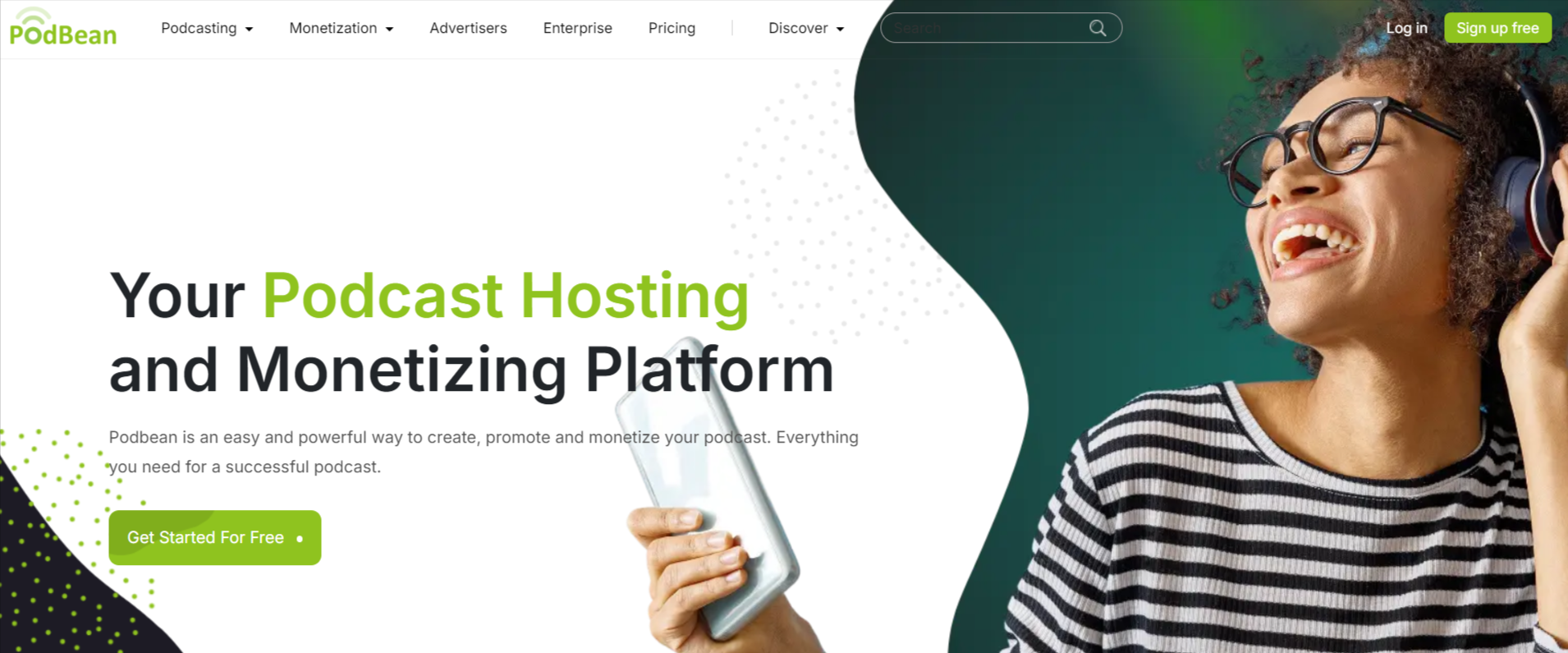
Podcast hosting platforms are where you upload and store your episodes. They are then distributed to sites – such as Spotify and Apple Podcasts – where listeners can go to find, download, and listen to your episodes.
The cost of these platforms ranges from free to upwards of $150 a month. Within this range, there are lots of affordable, mid-priced plans.
The features will vary, so make sure the plan you choose supports your podcasting ambitions. Things to look for include the number of hours of uploads permitted each month.
Do you need a podcast hosting platform?
Technically, no. You can host your podcast on your personal website. However, even if you’re working with a low budget, hosting platforms are really the best way to go.
They often provide additional tools to help you create and monetize your podcast, such as:
- App-based recording/editing facilities
- Live streaming capabilities
- Website (or integration to your own site)
- Analytics
- Advertising opportunities
- Subscription management
Example podcast hosting platforms
Here is a selection of platforms, so you can get an idea of what’s available for your budget.
Libsyn
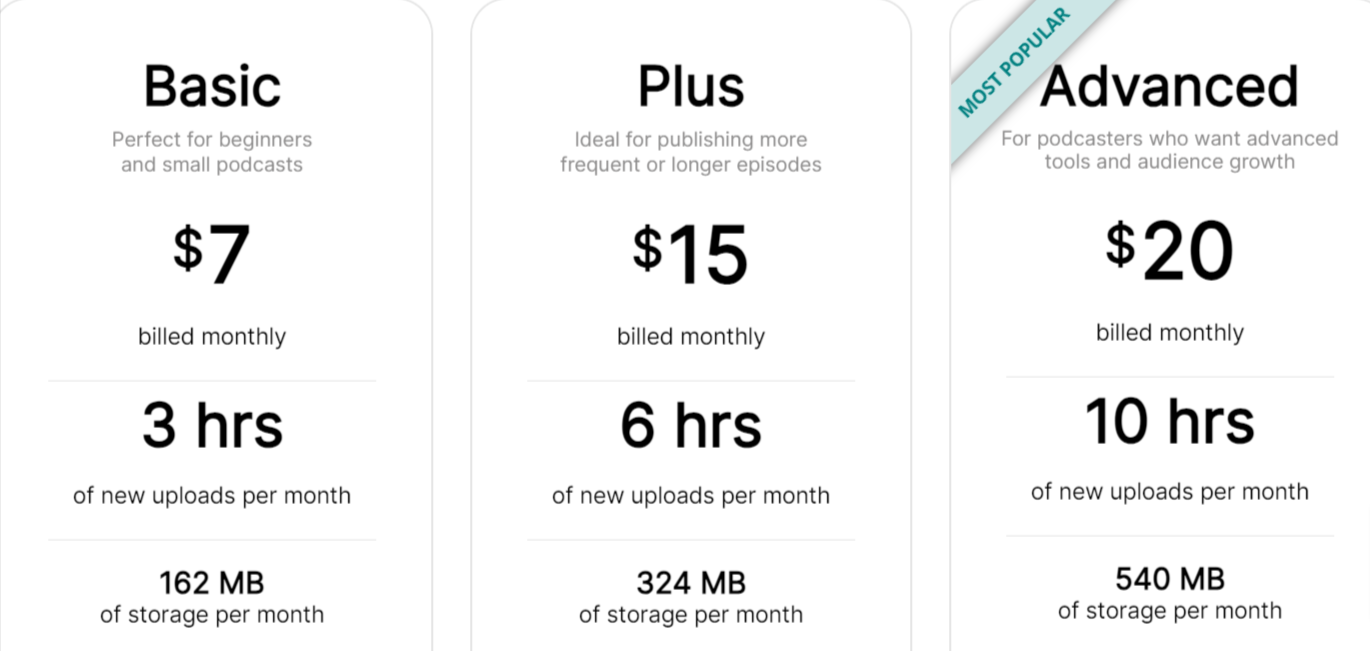
Libsyn is one of the most popular podcast hosting platforms. There is no free plan but the lowest-priced options have ample features to get you started at a reasonable cost. You can cancel at any time.
The advantage of Libsyn is that it also has three higher-priced plans, costing $40, $75, and $150 a month. These plans offer extra storage so you can upload up to 55 hours per month. This means the platform is flexible enough to grow with you.
Buzzsprout
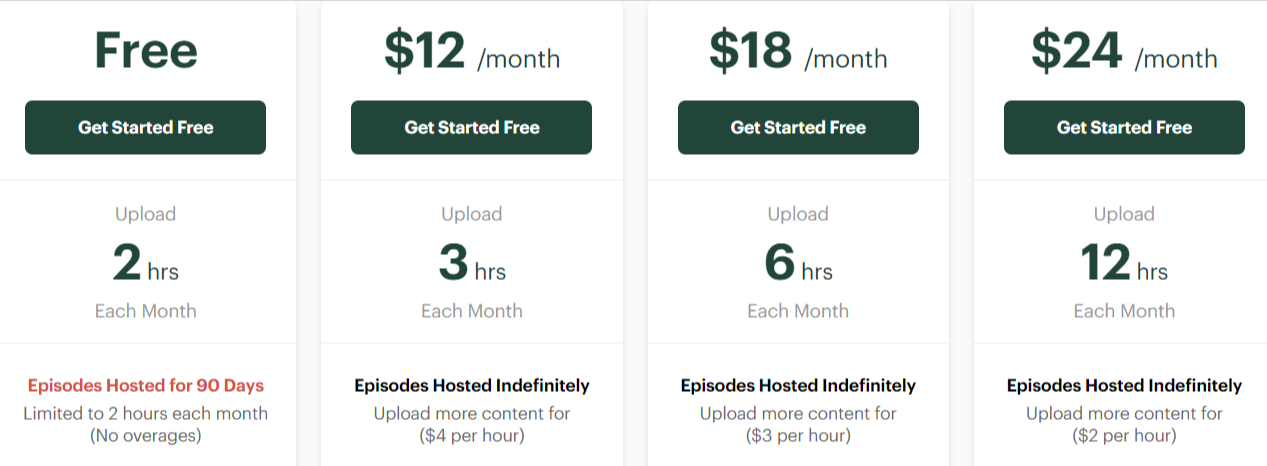
Another leading player in the podcast hosting space, Buzzsprout has four plans which are reasonably priced and offer a good selection of features. It also has plenty of tutorials and guidance to help you get the most from podcasting.
There is a free plan but the features are limited. Notably, your episodes will only be hosted for 90 days. So, while a free option may seem attractive, it might prove to be a false economy if you’re serious about establishing a podcast.
Podbean
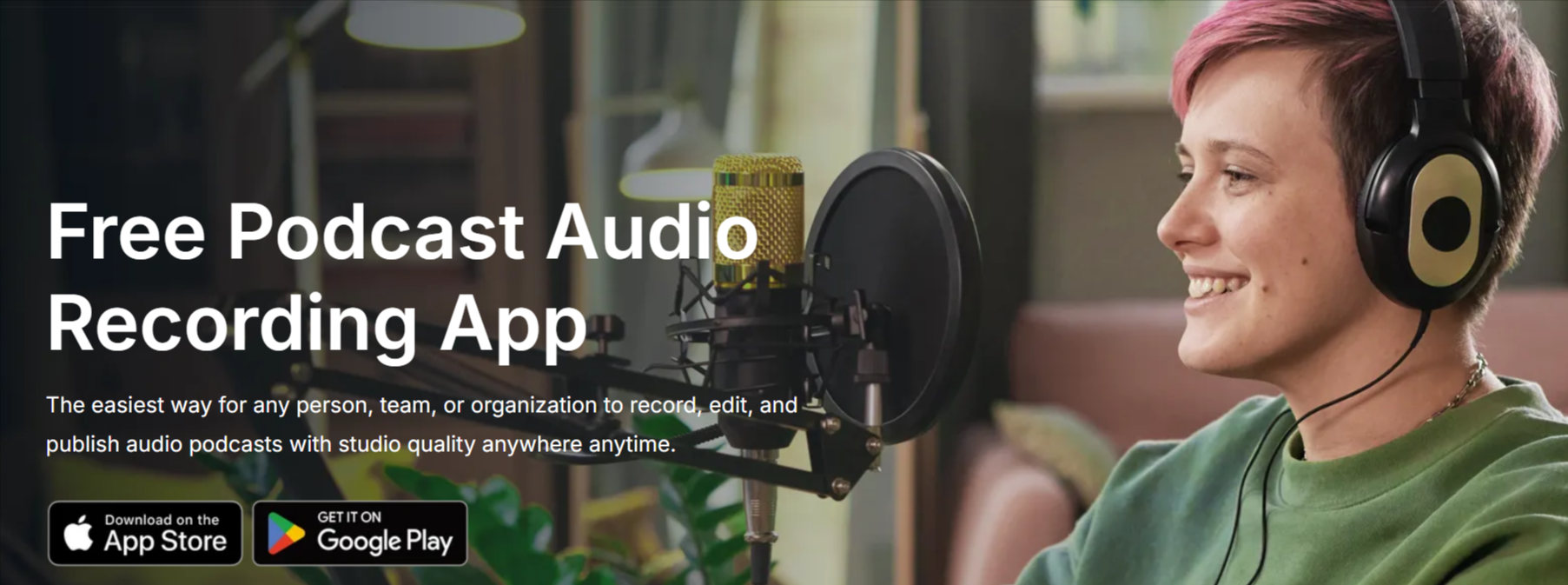
A third leading platform is Podbean. It offers an easy-to-use interface, which supports audio and video. You can also find a good range of resources to get started. It supports subscriptions and adding ads to your podcast.
As you can see, the free plan is quite limited in terms of monthly uploads and storage. Moving up to the $9 a month option gives you unlimited storage and 100 hours of uploads a month.
Find more of the best podcast hosting platforms.
Equipment
Launching a podcast means creating multiple episodes of audio content, which is available to listeners on demand. So, you’ll need a way to capture and store your content.
For a professional look and feel, you will likely want to edit your content to ensure the sound and production are high quality. Therefore, the main pieces of equipment you’ll need are:
- Microphone/stand
- Headphones
- Audio recorder
- Editing software
The good news is that there are some DIY solutions which allow you to create your own podcasting studio without spending a lot of money.
Similarly, if you are committed to your podcasting career, you might want to invest in some high-end equipment.
Hiring a Studio
Before we delve into buying your own equipment, it’s worth mentioning studio hire.
As podcasting has grown in popularity, so has the availability of fully-equipped rent-by-the-hour (or day/half-day) studios or booths.
The cost of these facilities varies by location and size, but – in the U.S. – they generally range from around $20 to $300+ per hour.
If you want to explore this option, you can search your local area or go through a specialist platform, such as Podcast Rental. Co-working offices, such as VentureX, often have podcasting studios available on-site.
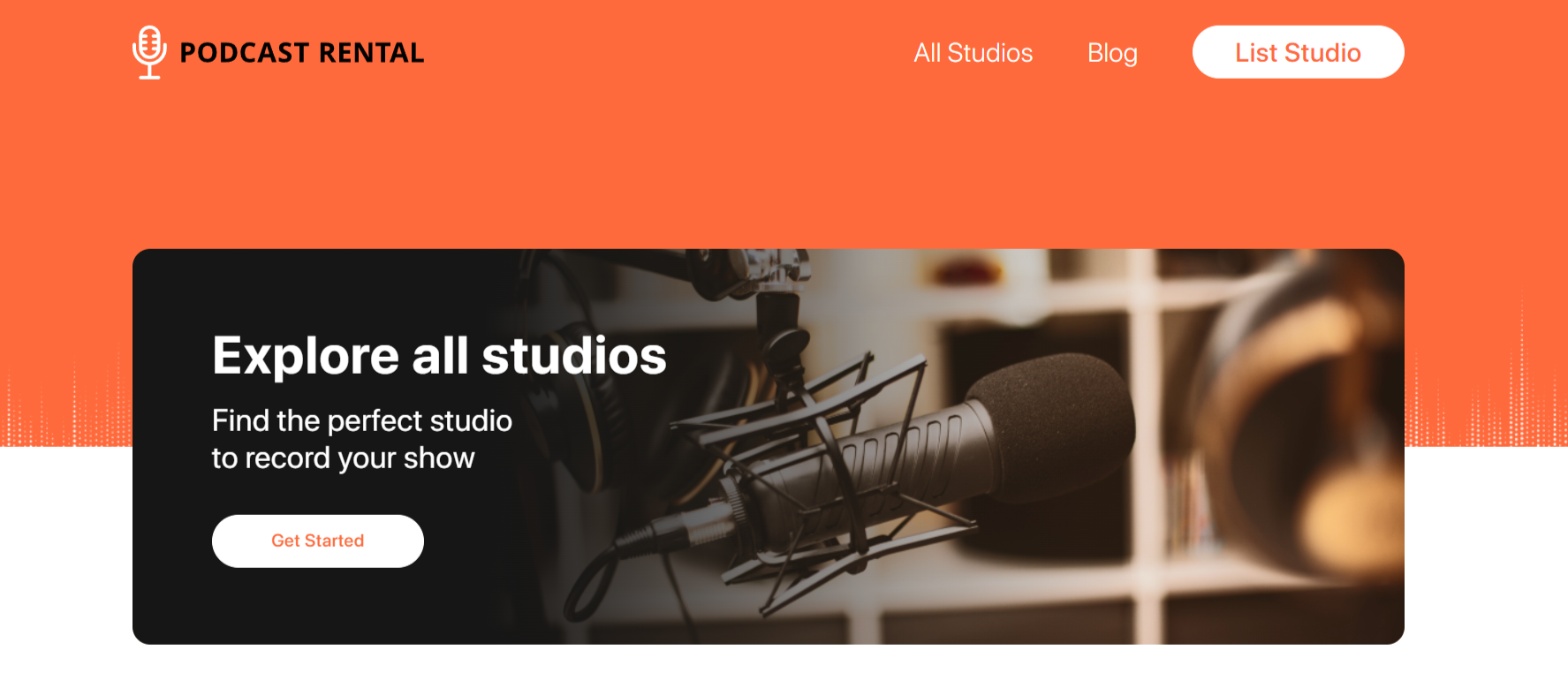
Depending on where you’re located, the rental route might prove to be a more cost-effective solution. It gives you access to the equipment you need without a long-term commitment.
Studios have a professional vibe and can accommodate multiple guests. Pods are smaller, offering a quiet space where you can record your episodes.
However, if you want your own podcasting equipment, here are the options in each budget range.
$$$ High budget options ($1,000+)
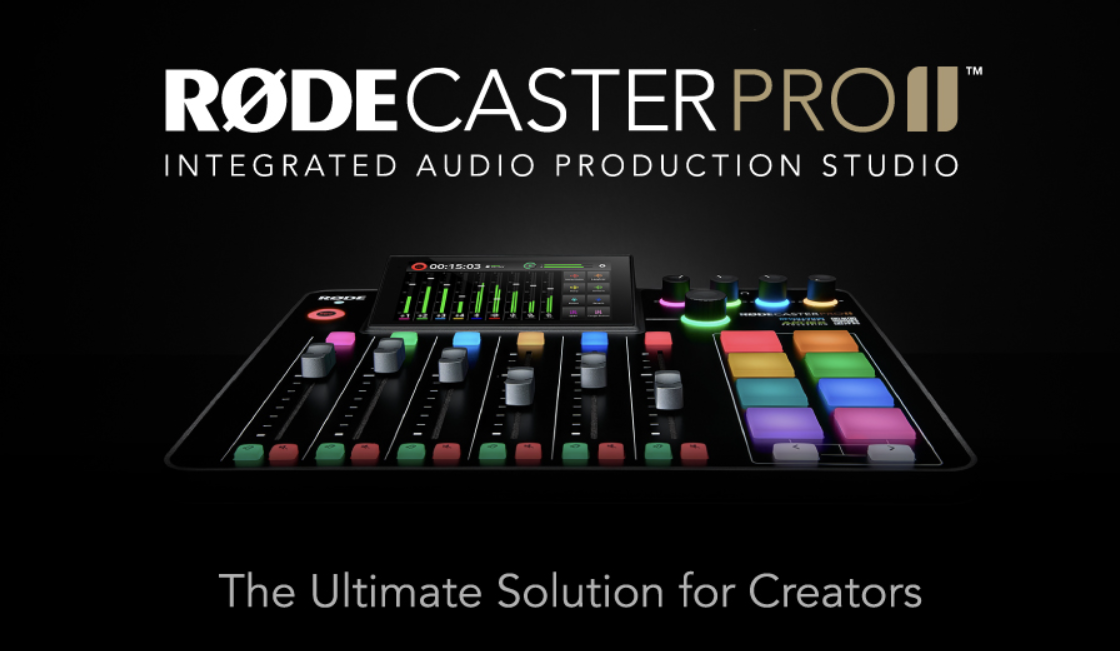
If money is no object, you can set yourself up with a high-end home studio. Example kit includes:
- Beyerdynamic DT770 Pro Headphones ($170)
- AKG Pro Audio C414 XLII Vocal Condenser Microphone ($1,000)
- RØDE PSA1 Professional Studio Boom Arm with ZAYKiR Microphone Stand Extension ($100)
- RØDECaster Pro II All-in-One Production Solution ($700)
The sky’s the limit when it comes to how much you could spend on equipment. However, when you’re just starting out, you can get the quality and functionality you need for far less.
$$ Mid-range budget options ($200 to $1,000)
Dropping down to a more modest budget still allows you to buy quality equipment to give your podcast a professional sound. For example:
- Sony MDR7506 Professional Large Diaphragm Headphones ($100)
- Shure MV7X XLR Podcast Microphone ($180)
- Gator Frameworks Short Weighted Base Microphone Stand ($40)
- Focusrite Scarlett 4i4 USB Audio Interface ($250)
- Zoom PodTrak P4 Portable Multitrack Podcast Recorder ($320)
As you grow your podcast, you might wish to spend a little more. But many aspiring podcasters will want to get started for as low an investment as possible.
$ Low budget options ($0 to $200)
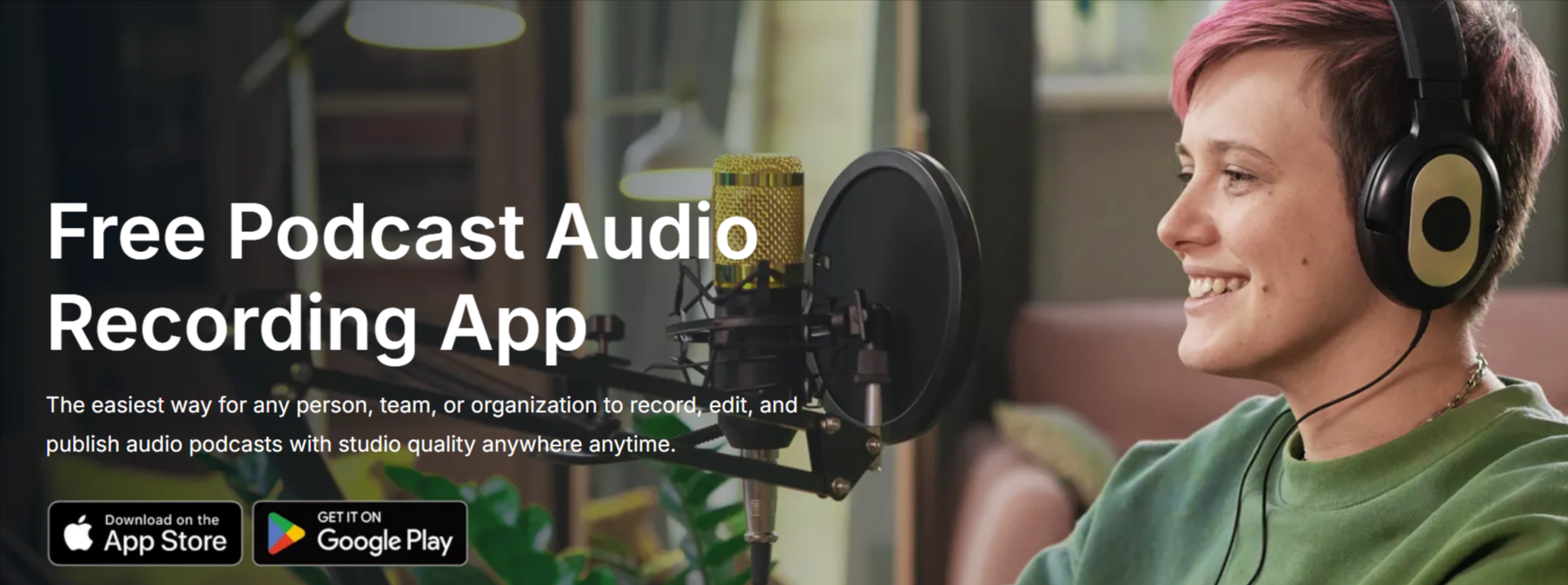
At the lower end, you can buy basic podcast equipment bundles for around $30 to $100. Alternatively, you can buy pieces of equipment separately. For example:
- Samson Technologies Q2U Microphone ($70)
- MAONO USB/XLR Podcast Dynamic Microphone, Studio Mic Kit ($60)
- OneOdio Wired Over Ear Headphones ($35)
- Zoom H1n Handy Recorder ($80)
If you’re trying to get started as cheaply as possible, your laptop’s built-in mic or smartphone can capture your podcast’s audio. This avoids the need to buy a separate recorder.
For editing, you can download a dedicated app to polish your recording before uploading the file to your chosen podcast hosting platform.

For example, Audacity is a free app which provides open source editing and recording tools. Other options include:
- Riverside (basic free plan)
- Descript (basic free plan)
- Spotify for Podcasters (free)
- Podbean Podcast App (basic free plan)
- Garageband (for Apple device users)
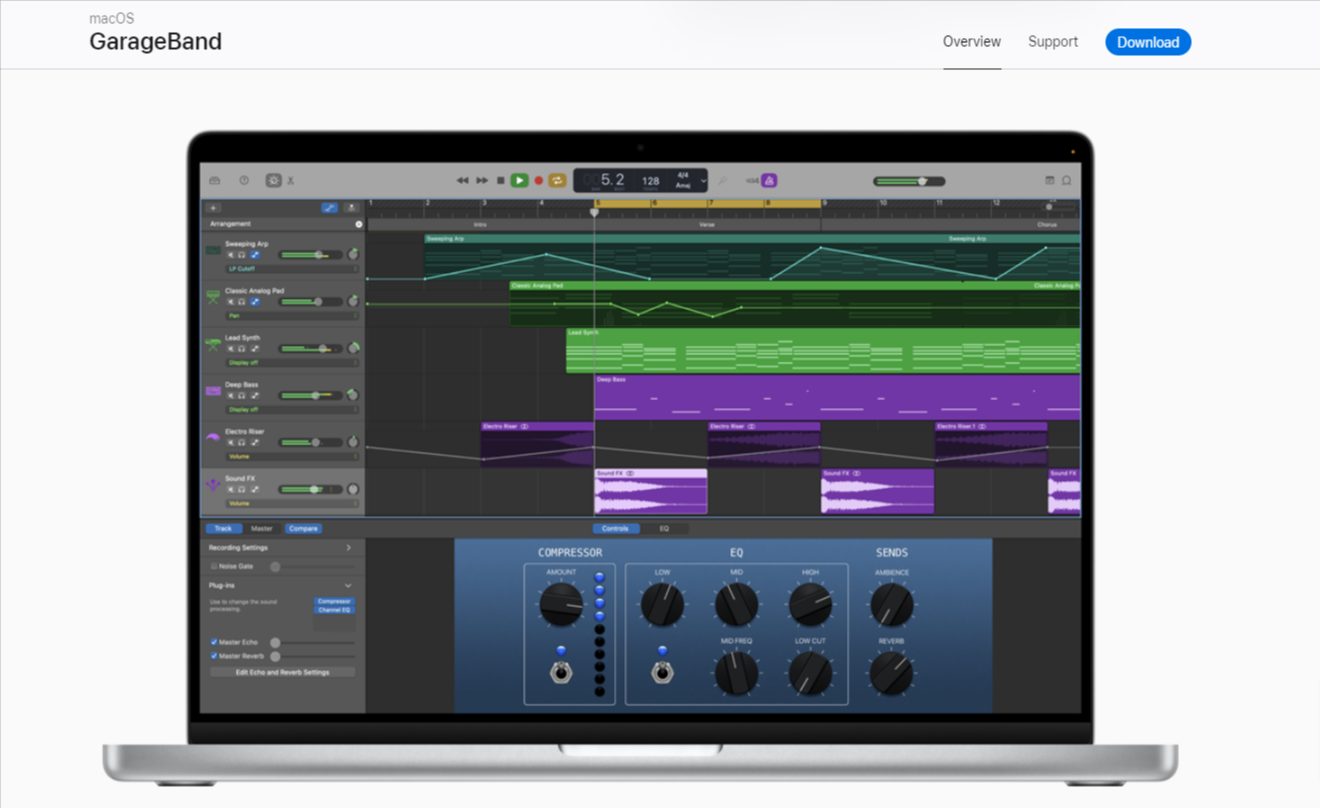
To grow and monetize your podcast, you’ll probably want to invest in more sophisticated equipment and software. However, if you’re just getting started with podcasting, these low-end options are a good way to test the water.
Other Costs
If you have some money to invest in your podcast, there are some optional extras you might wish to add, such as:
Domain/website hosting: If you haven’t already got your own site set up and don’t want to rely on the one provided by your podcast hosting platform, you will want to buy a separate domain and hosting service.
Marketing: Most marketing functions can be done yourself for free (such as social media, SEO, and submitting to podcast directories). However, as you grow, you might consider outsourcing some of these activities to free up time and maximize your return on investment.
Podcast Costs: Overview
Overall, the cost of starting a podcast can range from $100 to $5,000. At the lowest end, you might even be able to get up and running for $0, if you already have the basic equipment and choose a free hosting plan.
This means that whatever level of investment you are able to make, your dream of launching a podcast can become a reality. Once you’ve found your feet, you can spend more on a pricier hosting plan and higher-end equipment.
Remember, any outlay on your podcast can be more than outweighed by the monetization potential – that’s where Whop comes in.
Explore all our podcasting resources here.
Maximize Your Podcasting Revenue with Whop
If you want to start or scale an online business, Whop is here to support you, every step of the way.
Our all-in-one platform is the perfect partner for selling all kinds of digital products. With Whop, you can:
- Create a paid community for your podcast
- Sell downloadables, like ebooks, PDFs, exclusive podcast show notes, and more
- Make and host a forum for your Podcast
- Host video calls in your own whop (think one-on-ones and webinars)
- Allow listeners to support you with a donations link
That means once you’ve got your podcast up and running on a hosting platform, Whop is here to supercharge your monetization efforts.
Create complementary downloads, courses, communities or memberships – the choice is yours. Get started for free today.


